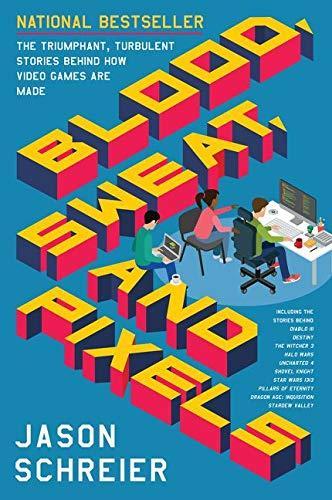Review of 'Blood, Sweat, and Pixels : The Triumphant, Turbulent Stories Behind How Video Games are Made' on 'Goodreads'
2 stars
Ten separate articles about the making of 10 particular video games, with no connecting materials or conclusions drawn. May be of interest to players of those games, but fails to live up to the cover blurbs, e.g. "A fascinating and remarkably complete pantheon."
The ten games, in order, are Pillars of Eternity, Uncharted 4, Stardew Valley, Diablo III, Halo Wars, Dragon Age: Inquisition, Shovel Knight, Destiny, The Witcher 3, and Star Wars 1313. Only the last was never released. There was only a very scant conclusion with no "lessons learned", so here's what I gleaned from the stories.
Making video games is harder than you think. New consoles and platforms are challenging (though no mention was made of cross platform libraries that make it a little easier). Having a big company running things makes it easier (more money) and harder (less flexible deadlines). Games ship late because of bugs. Almost all games suffer from "crunch time" (serious developer overtime to finish the game), nobody wants to do that, and it usually results from bugs.
Now that I've lent Jason Schreier a concluding paragraph that at least sums up what this book is about, the worst thing I saw were the bugs. This isn't life and death quality software, but surely the libraries also come with test suites? If a particular scene is vulnerable to shots going out of bounds, surely there are "shoot every direction" bots that would test for that? Based on the stories in this book, I am appalled at the level of testing directed at video games, and the amount of developer hours it costs teams at the end of their projects.
If you have played one or more of the titles listed and really want to know some of what went behind making those games, this book might be of interest to you. Since the 10 articles are not connected in any way, it could also be read like a short encyclopedia. I didn't get much out of it, and wouldn't recommend it - it really didn't live up to the hype. 1½ stars.
Further cover quotes:
"Gripping, intelligent." - no.
"Opens a crucial door into an abnormally secretive industry." - maybe, is any other software more open?
"Brutal, honest, yet ultimately uplifting." - I do trust that the stories told here are honest, but don't see them as either brutal or uplifting, much less both. This last quote is from Adam Conover (Adam Ruins Everything) who goes further to say "I was surprised by every page." Adam has clearly never worked in software, and besides many of these stories are quite similar to each other.

